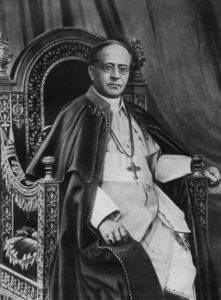All Men Are Under the Dominion of Christ
 An excerpt from Quas Primas:Encyclical of Pope Pius XI on the Feast of Christ the King
An excerpt from Quas Primas:Encyclical of Pope Pius XI on the Feast of Christ the King
It would be a grave error, on the other hand, to say that Christ has no authority whatever in civil affairs, since, by virtue of the absolute empire over all creatures committed to Him by the Father, all things are in His power.
Nevertheless, during His life on earth He refrained from the exercise of such authority, and although He Himself disdained to possess or to care for earthly goods, He did not, nor does He today, interfere with those who possess them. Non eripit mortalia qui regna dat caelestia.
Thus the empire of our Redeemer embraces all men. To use the words of our immortal predecessor, Pope Leo XIII:
“His empire includes not only Catholic nations, not only baptized persons who, though of right belonging to the Church, have been led astray by error, or have been cut off from her by schism, but also all those who are outside the Christian faith; so that truly the whole of mankind is subject to the power of Jesus Christ.”
Nor is there any difference in this matter between the individual and the family or the State; for all men, whether collectively or individually, are under the dominion of Christ.
In Him is the salvation of the individual, in Him is the salvation of society.
“Neither is there salvation in any other, for there is no other name under heaven given to men whereby we must be saved.”
He is the author of happiness and true prosperity for every man and for every nation.
“For a nation is happy when its citizens are happy. What else is a nation but a number of men living in concord?”
If, therefore, the rulers of nations wish to preserve their authority, to promote and increase the prosperity of their countries, they will not neglect the public duty of reverence and obedience to the rule of Christ.
What we said at the beginning of Our Pontificate concerning the decline of public authority, and the lack of respect for the same, is equally true at the present day.
“With God and Jesus Christ,” we said, “excluded from political life, with authority derived not from God but from man, the very basis of that authority has been taken away, because the chief reason of the distinction between ruler and subject has been eliminated. The result is that human society is tottering to its fall, because it has no longer a secure and solid foundation.”
Given at St. Peter’s, Rome, on the eleventh day of the month of December, in the Holy Year 1925, the fourth of our Pontificate.


No comments:
Post a Comment